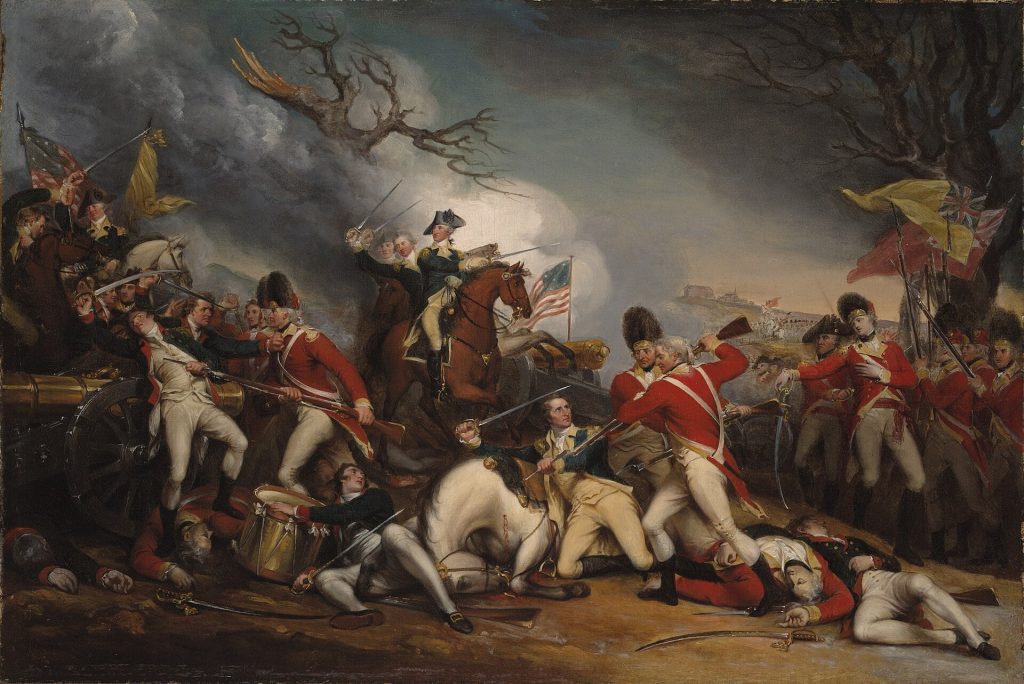Contents
Contents
The Battle of Princeton was fought between the Continental Army and the British Army on January 3, 1777.
Following victory at the Battle of Trenton eight days earlier, George Washington‘s men engaged British troops at Princeton, New Jersey, scoring another victory for the Patriot side.
Summary
Leadup
In late 1776, the Continental Army was facing its most difficult period of the war so far.
Earlier that year, Washington suffered a series of defeats at the hands of the British Army and Hessian mercenaries (German soldiers-for-hire).
He therefore retreated into Pennsylvania, at which point the British mostly retired to their quarters to rest for the winter, believing that the Continental Army would do the same.
Instead, Washington launched a surprise attack on the Hessians at Trenton, after completing a treacherous crossing of the Delaware River on the night of December 25-26, 1776.
The Continental Army won the battle, catching the German forces completely off guard.
Having replenished his army with Hessian supplies, Washington decided to press on before allowing his men to rest for the winter.
The British Army in the area was under the command of General Charles Cornwallis, and numbered approximately 5,000-6,000 men.
Their goal was to regroup and reinforce the few remaining Hessian soldiers, with Cornwallis rushing from New York to Princeton, before advancing on Trenton.
Remaining in New Jersey, Washington’s forces clashed with the British briefly at the Battle of the Assunpink Creek, just south of Trenton, on January 2, 1777, resulting in American victory.
The battle
On the night of January 2, Washington and his generals realized that in advancing on Trenton, the British had failed to guard their positions at Princeton.
The next morning, under the cover of darkness, Washington and approximately 4,500 men marched on an unguarded backroad to Princeton.
However, on the way, they were spotted by a column of 1,200 British soldiers under the command of Lieutenant Colonel Charles Mawhood, who were moving to reinforce the British position near Trenton.
Washington intended to complete the march overnight to avoid being spotted, but progress was slower than expected, and his men were seen by the British as the sun rose.
Immediately, musket and rifle fire was exchanged between the two sides. But at the same time, the two armies were in a race to reach Princeton, so the battle was dynamic, and constantly moving.
The Americans initially struggled, with Brigadier General Hugh Mercer fatally wounded by bayonet in the early stages of the battle.

Mercer’s men began to disintegrate, but Washington soon arrived, personally directing his men on the battlefield, at great personal risk to himself.
The British were well-trained and fought well, but were significantly outnumbered, with only 1,200 troops near Princeton compared to Washington’s 4,500 men.
With the help of Brigadier General John Cadwalader, Washington’s men launched a counterattack and soon broke the British line, at which point Mawhood and his men decided to retreat.
The Continental Army had the upper hand from this point on, with many British attempting to flee to Trenton. They soon approached Princeton and took the city with relative ease, suffering only about 40 killed and 40 wounded during the course of the battle – about half the number of British casualties.
Significance
Similar to the Battle of Trenton, victory at the Battle of Princeton was a huge psychological boost for the Continental Army.
Prior to crossing the Delaware and taking Trenton and Princeton, the Continental Army was on the verge of falling apart.
The army was facing significant supply shortages – many of the soldiers’ uniforms were in tatters – and most troops’ enlistments were about to expire. Washington himself questioned if he was about to lose the war.
Instead, through smart military strategy, Washington was able to turn the tide of the conflict, and convince his men to continue fighting.
Having captured Princeton, the Continental Army was in a much better position to disrupt British supply lines, forcing them to withdraw from most of New Jersey.
The final battles of the New York and New Jersey Campaign proved to be a pivotal turning point in the Revolutionary War, in favor of the American Patriots.
Facts
- George Washington ordered his men to light campfires at the position they marched from near Trenton, fooling the British into believing they were still in position.
- The Battle of Princeton lasted less than an hour in total. The fighting was fierce, and very fast-moving.
- Princeton University was caught in the crossfire during the conflict. Known at the time as the College of New Jersey, its Nassau Hall was occupied by British troops and damaged by American cannonball fire.
- When General Mercer was bayoneted, the British believed him to be George Washington.
- During the counterattack, Washington put himself in immense danger, riding on horseback ahead of his troops, and within range of British artillery fire. His leadership in this moment was essential for Patriot victory.

